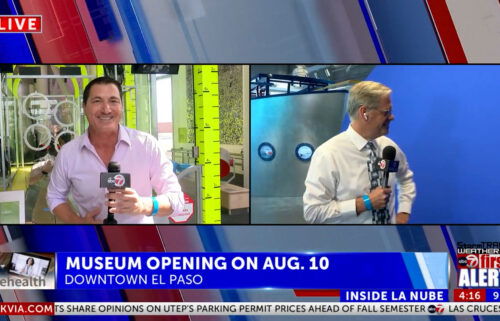Why some people might want to get a COVID-19 shot in their thigh instead of their arm
Click here for updates on this story
Toronto, Ontario (CTV Network) — While the majority of Canadians will roll up their sleeve for a COVID-19 vaccine when it’s their turn, there are some who may want to consider an alternate injection site, such as the thigh.
Because the COVID-19 vaccines are designed to be delivered into muscle, the upper arm is typically chosen because it’s convenient and is believe to be less painful for the patient than for other parts of the body.
However, there are a few rare instances in which people should speak to their health-care provider about receiving the shot somewhere else.
LYMPHEDEMA
Those who suffer from lymphedema in both of their arms may want to consider having their COVID-19 vaccine injected into their thigh or another part of the body.
Lymphedema is a chronic and painful condition that causes abnormal swelling in certain parts of the body due to a build up of lymph fluid in the tissues.
While some people are born with lymphedema, others develop the condition after there is damage to their lymphatic system, which can be caused by trauma, injury, or a burn. It’s more common, however, for people to develop lymphedema in a part of the body where lymph nodes have been removed or damaged, such as in cancer treatment.
Dr. Gregory Czarnota, a radiation oncologist and clinician scientist at Sunnybrook Health Sciences Centre in Toronto, explained that lymph nodes are removed during cancer surgeries because the cancer can sometimes spread to them.
In breast cancer surgery, for example, the lymph nodes would be removed from the armpit or the shoulder.
With fewer lymph nodes to drain fluid in a particular part of the body, such as in the arm, Czarnota said that backup drainage can occur.
“It’s just like a sink that fills up with water. If you take out all the lymph nodes and you compromise the lymphatic drainage, you can actually end up with a limb that sort of swells up,” he told CTVNews.ca during a telephone interview on Thursday. “It gets filled up with water just the same way as your sink.”
Because the lymph nodes drain fluid regionally, lymphedema is usually concentrated in one limb or area of the body.
Shan Liao, an associate professor of microbiology, immunology and infectious diseases at the University of Calgary, whose research focuses on lymphedema, said it’s perfectly safe for someone with lymphedema in one arm to receive a vaccine in the other healthy arm.
Dr. Ian Dayes, a radiation oncologist and associate professor at McMaster University in Hamilton, Ont., said it’s quite rare for people to have lymphedema in both arms at the same time because it’s usually caused from breast cancer treatment and the majority of patients only have breast cancer in one breast.
“I certainly don’t think anybody who’s just had it on the one side, should particularly worry about this,” he said.
WHAT ARE THE RISKS?
If someone has lymphedema in both arms, though, Liao said they should consider getting a vaccine in their thigh because it’s possible their condition will reduce the efficacy of the COVID-19 vaccine they receive.
Liao explained that when a vaccine is injected it drains through the lymphatic system to the lymph nodes, which play an important role in helping the body fight off infections and diseases.
“In the lymph node, our immune cells in the lymph node will recognize the vaccine and they start to produce a lot of antibodies or other immune responses and generate the real protection,” she said.
If lymph nodes have been removed or damaged in one part of the body, such as in the arm, the vaccine won’t be able to travel through the lymphatic system and drain to the lymph nodes.
“You do need to have the lymphatic and the lymph node to be most effective,” Liao said.
If a vaccine is injected into a limb with lymphedema, Czarnota said there is also a slightly increased risk of infection for that individual.
“Generally, patients with lymphedema in a limb are advised: ‘Don’t have tattoos on that limb. Don’t get injections in that limb. Don’t get blood out of that limb. Don’t do anything that’s going to further compromise the circulatory systems in that limb,” he said.
“People with lymphedema are prone to the limb getting infected because it’s all swollen up and the lymphatic fluid is just sort of sitting there and not draining.”
Liao said that should only really happen in very severe cases of lymphedema where there is a lot of swelling.
Because lymphedema can take years to develop and doesn’t show up right away after breast cancer surgery or radiation, for example, Dayes said it’s common for patients to be worried about it appearing at some point in their lives.
He said that while there’s a theoretical risk that an infection could trigger lymphedema in these patients because the remaining lymph nodes that haven’t been removed might get overwhelmed by the infection and there’s a resulting backup of fluid, he said there isn’t a lot of support for this in the medical literature.
If a patient with lymphedema or one who has a higher risk of developing the condition is concerned about infection, Dayes said they should still get the COVID-19 vaccine, but they should request that it’s injected in an unaffected limb or area.
“The danger of the virus is far exceeding any potential risks that we’re worried about from the vaccine and I think that’s potentially even more so true for a person who is a cancer survivor,” Dayes said.
ARE COVID-19 THIGH SHOTS AVAILABLE?
For Canadians looking to have a COVID-19 vaccine injected in their thigh or somewhere other than the arm, a spokesperson for Health Canada and the Public Health Agency of Canada said they should speak to their doctor about their options.
“As vaccination is done at the provincial/territorial level, people looking to make special arrangements should get in touch with their local/regional public health authorities or their health-care provider,” the spokesperson said in an emailed statement to CTVNews.ca on Friday.
CTVNews.ca reached out to a number of provincial health authorities to see if they offered COVID-19 vaccines in alternative injection sites.
Spokespersons for the ministries of health for Ontario, Quebec, British Columbia, Saskatchewan, New Brunswick, and Alberta all responded that if there are exceptional circumstances and the immunizer is trained in the administration of a vaccine into the thigh, that person will be accommodated.
Most of the provincial health authorities recommended that people seeking an injection somewhere other than the arm call the site where the vaccination appointment is scheduled to ensure they have someone there who is trained to deliver the shot.
They also recommended booking an appointment by phone, instead of online, to be able to make alternative arrangements with the agent.
Please note: This content carries a strict local market embargo. If you share the same market as the contributor of this article, you may not use it on any platform.
Nicole Bogartctvnews.caproducers@bellmedia.ca(416) 384-5000




